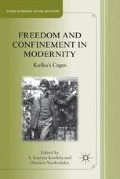Abstract
Among the fragments to be found in Franz Kafka’s octavo notebooks, there is a curious proposal for what appears, at first glance, to be a utopian community of dedicated workers. Unlike the surrounding fragments, the proposal is more akin to an historical or sociological document than a literary sketch or philosophicoreligious meditation. It stands out, above all, because of its odd officiousness, as if the insurance office from which Kafka had recently been released suddenly insinuates itself into his literary existence. Kafka called the fragment “Die besitzlose Arbeiterschaft,” which I will henceforth translate, with some reservations, as “Workforce without Possessions.”1 Arbeiterschaft designates a body of workers, sometimes—but not necessarily—organized into a union. Unlike workforce, the German term does not imply stored-up labor power, which can be effectively applied to a given economic situation; rather, it suggests nothing beyond a collection of workers whose only commonality lies in the work they are called upon to perform, whether alone or in combination with one another. Probably written in February or March of 1918, “Workforce without Possessions” is neither a defense nor a critique of the October Revolution in Russia, the events of which Kafka seemed to follow with some degree of interest.
Access this chapter
Tax calculation will be finalised at checkout
Purchases are for personal use only
Preview
Unable to display preview. Download preview PDF.
Notes
See Franz Kafka, Gesammelte Werke in zwölf Bänden, ed. Hans-Gerd Koch (Frankfurt a.M.: Fischer, 1994), 6: 221–23; all translations of the Kafka texts are my own.
For a brief discussion of the fragment in relation to Zionism, see Bill Dodd, “The Case for a Political Reading,”, The Cambridge Companion to Kafka, ed. Julian Preece (Cambridge: Cambridge University Press, 2002), 139–140.
Franz Kafka, Wedding Preparations in the Country and Other Posthumous Prose Writings, ed. Max Brod, trans. Ernst Kaiser and Eithne Wilkins (London: Secker and Warburg, 1954), 119–20. Brod included the entire text, with little commentary, in his Franz Kafka: A Biography, trans. Humphrey Roberts (New York: Schocken, 1960), 84–85.
See Walter Benjamin, “Goethes Wahlverwandtschaften,”, Gesammelte Schriften, eds. Rolf Tiedemann and Hermann Schweppenhäuser (Frankfurt a.M.: Suhrkamp, 1972–91), 1: 126.
Max Brod, Das große Wagnis (Leipzig and Vienna: Wolff, 1918), 59.
Franz Kafka and Max Brod, Eine Freundschaft, ed. Hannelore Rodlauer and Malcolm Pasley (Frankfurt a.M.: Fischer, 1987–89), 2: 189.
For an extraordinary exposition of the sideway character of time in Hölderlins late poetry, see Werner Hamacher, “Parusie, Mauer. Mittelbarkeit und Zeitlichkeit, später Hölderlin,” Hölderlin-Jahrbuch 34 (2004–5): 93–142.
Ernst Troeltsch, “Luther, der Protestantismus und die moderne Welt,” reprinted in Gesammelte Schriften, ed. Hans Baron (Tübingen: Mohr, 1925), 4: 213.
See especially Nigel Rothfels, Savages and Beasts: The Birth of the Modern Zoo (Baltimore, MD: Johns Hopkins University Press, 2002).
The fragments under consideration here can be found in Kafka, Gesammelte Werke, 6: 40–45 and 96–100. For a discussion of the Hunter Gracchus fragments that mentions the Gracchus family of ancient Rome, see Guy Davenport, “The Hunter Gracchus,” The New Criterion 14 (1996): 27–35.
The tradition in which the association with the Roman family is dismissed and replaced with an interpretation that emphasizes the grackle begins with Wilhelm Emrich’s magisterial Franz Kafka (Bonn, Athenäum, 1958), 21.
It is reiterated in Hartmut Binder, Kafka Handbuch (Stuttgart: Kröner, 1979), 2: 337, who discusses Kafka’s desire, as a city-dweller, to be in the country, “Der Jäger Gracchus. Zu Kafkas Schaffensweise und poetischer Topographie,” Deutsche Schillergesellschaft 15 (1971): 375–440.
Kafka would have been familiar with the story of the Gracchi from his schoolboy lessons in Latin, which probably included copious amounts of Livy’s History of Rome. More importantly, as Joel Morris has detailed in an as yet unpublished paper, in 1916 Kafka read Samuel Lublinski’s Entstehung des Judentums, which discusses the Gracchus family in conjunction with its critique of Roman civilization. According to Lublinski, the Romans, who thought of themselves as utterly distinct from the slaves whom they conquered, were unable to address “the social question,” a failure made evident by the incompleteness of the Gracchian reforms; see Samuel Lublinski, Entstehung des Judentums aus der antiken Kultur (Jena: Diederichs, 1910), esp 43–44. Through the intercession of Max Brod Kafka also became familiar with Adolph Damaschke’s Bodenreform, which includes two chapters about the land reform movements initiated by Tiberius Gracchus and Gajus Gracchus; see Adolph Damaschke’s Bodenreform: Grundsätzliches und Geschichtliches zur Erkenntnis und Überwindung der sozialen Not, 4th ed. (Berlin: Buchverlag der “Hilfe,” 1907), 227–39.
Immanuel Kant, Gesammelte Schriften, ed. Königlich Preußische [later Deutsche] Akademie der Wissenschaften (Berlin: Reimer; later, De Gruyter, 1900–), 6: 250; Doctrine of Right §2 in its original version, which some recent English editions of the text have altered. For further discussion of this paragraph, see my essay, “Marital, Martial, and Maritime Law: Toward Some Controversial Passages in Kant’s Doctrine of Right,” Diacritics 35 (2005): 101–120.
John Locke, Two Treatises of Government, ed. Peter Laslett (Cambridge: Cambridge University Press, 1960), 303–18.
For the suggestion that Bacchus is to be read in Gracchus, see Erwin Steinberg, “Three Fragments of Kafka’s ‘The Hunter Gracchus,’” Studies in Short Fiction 15 (1978): 307–17.
Editor information
Editors and Affiliations
Copyright information
© 2011 A. Kiarina Kordela and Dimitris Vardoulakis
About this chapter
Cite this chapter
Fenves, P. (2011). “Workforce without Possessions”: Kafka, “Social Justice,” and the Word Religion. In: Kordela, A.K., Vardoulakis, D. (eds) Freedom and Confinement in Modernity. Studies in European Culture and History. Palgrave Macmillan, New York. https://doi.org/10.1057/9780230118959_7
Download citation
DOI: https://doi.org/10.1057/9780230118959_7
Publisher Name: Palgrave Macmillan, New York
Print ISBN: 978-1-349-29526-5
Online ISBN: 978-0-230-11895-9
eBook Packages: Palgrave Literature CollectionLiterature, Cultural and Media Studies (R0)

